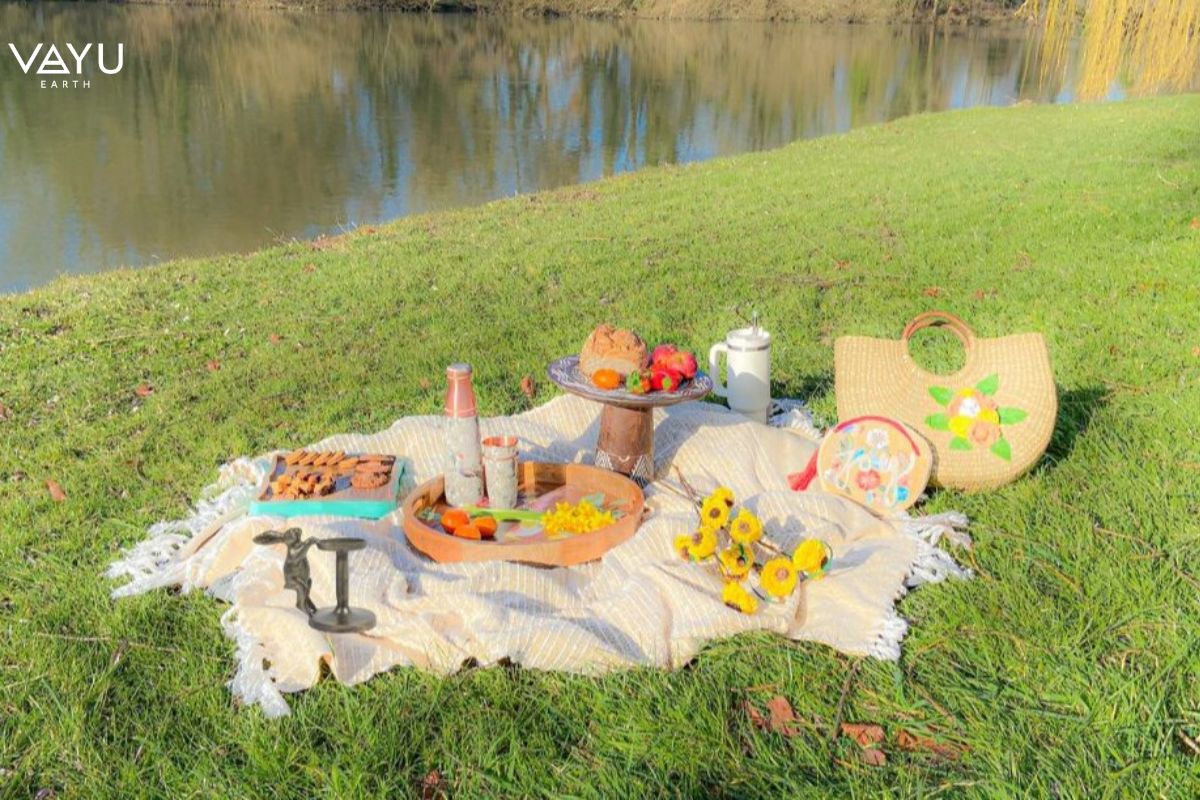The Easter Bunny and Egg Symbolism: Unveiling the Meaning Behind Easter Traditions

Easter is a celebration rich in symbolism, with the Easter Bunny and eggs playing central roles in the festivities. While many enjoy chocolate eggs and adorable bunny decorations, the origins of these traditions are steeped in history and cultural significance. This Easter, embrace meaningful traditions while incorporating sustainable home decor solutions from Vayu Earth to celebrate in style.
Why Is the Easter Bunny a Symbol of Easter?

The Easter Bunny has become one of the most iconic figures associated with Easter, but its origins trace back to ancient traditions. The rabbit, known for its fertility and rapid reproduction, symbolises new life and renewal — key themes of Easter celebrations.
The tradition of the Easter Bunny is believed to have originated in Germany, where folklore spoke of the "Osterhase" or "Easter Hare." According to legend, this mythical creature would lay colourful eggs and deliver them to well-behaved children. German immigrants later brought this custom to other countries, including the United Kingdom and the United States, cementing the Easter Bunny as a cherished Easter icon.
Rabbits' connection to springtime fertility dates back even further to pagan festivals celebrating Ostara, the goddess of dawn and fertility. The rabbit, being closely tied to fertility and abundance, naturally became a symbol of growth, renewal, and hope. As Christianity spread, these themes merged with the story of Jesus' resurrection, reinforcing the concept of new beginnings.
In modern Easter traditions, the Easter Bunny is often portrayed as a friendly character who hides eggs in gardens, parks, and homes for children to find. This joyful practice blends family bonding, outdoor activities, and festive excitement into one cherished event.
The Symbolism of Easter Eggs

Eggs have long been regarded as symbols of fertility, birth, and new beginnings. In Christian traditions, eggs represent the resurrection of Jesus Christ — the hard shell symbolising the sealed tomb and the emerging chick symbolising new life. This powerful metaphor of rebirth ties beautifully with the themes of Easter.
In various cultures, eggs carry distinct meanings:
-
Greek Easter Eggs: Traditionally dyed red, these eggs symbolise the blood of Christ and his sacrifice, serving as a powerful reminder of his resurrection.
-
German Easter Eggs: German tradition often involves hiding brightly painted eggs in gardens for children to discover, which evolved into today’s Easter egg hunt.
-
Persian New Year Eggs: During the festival of Nowruz, painted eggs are included on the Haft-Sin table to represent fertility and new life.
In modern Easter celebrations, chocolate eggs have become a beloved alternative, blending delicious treats with cultural symbolism. Families often decorate hard-boiled eggs in pastel hues and creative patterns to enhance the festive spirit.
Incorporating Sustainable Easter Decor with Vayu Earth

Ref: Edible INDY
This Easter, celebrate consciously by incorporating sustainable decor into your home. Vayu Earth offers eco-friendly products that reflect timeless designs while embracing environmentally conscious living. Here are some ideas to elevate your Easter celebrations with sustainable charm:
-
Natural Table Decor: Create a beautifully rustic Easter table setting using Vayu Earth’s hand-carved wooden serving boards and ethically sourced ceramic platters. These elegant pieces not only add a touch of sophistication but also promote eco-friendly dining. Pair them with organic cotton table runners and linen napkins to complete the look.
-
Eco-Friendly Easter Basket Alternatives: Swap plastic baskets for Vayu Earth’s handwoven baskets made from sustainable materials. These stylish baskets can double as storage solutions after the holiday season. Fill them with handmade gifts, wooden toys, or naturally dyed eggs for a thoughtful and eco-conscious presentation.
-
Decorative Easter Eggs: Instead of disposable plastic eggs, opt for reusable wooden eggs or naturally dyed eggs. Display them in Vayu Earth’s ceramic bowls or handwoven baskets to create an elegant yet environmentally friendly centrepiece. Use natural dyes such as turmeric, beetroot, and red cabbage to create vibrant and chemical-free egg colours.
-
Spring-Inspired Soft Furnishings: Refresh your living space with Vayu Earth's organic cotton cushion covers and throws in soft pastel shades. These sustainable textiles bring warmth and comfort while adding a seasonal touch to your home. Incorporate floral patterns and light fabrics to capture the essence of spring.
-
Sustainable Candle Arrangements: For a cosy yet festive atmosphere, arrange soy wax candles from Vayu Earth alongside floral arrangements and decorative eggs to create a peaceful Easter glow. Their natural, toxin-free composition ensures a healthier home environment.
-
Floral Displays with Eco-Friendly Vases: Showcase fresh spring blooms like daffodils, tulips, and hyacinths in Vayu Earth's ethically sourced ceramic vases. These elegant designs complement natural decor themes and provide a striking focal point for your Easter table or entryway.
Sustainable Easter Activity Ideas for Families

-
DIY Egg Dyeing with Natural Ingredients: Involve your family in the tradition of dyeing Easter eggs using natural dyes made from kitchen ingredients. Try turmeric for yellow, beetroot for pink, or spinach for green. Not only is this safer for children, but it also minimises harmful chemicals.
-
Outdoor Nature Scavenger Hunt: Encourage children to explore their surroundings by creating a nature-themed scavenger hunt. Use clues that incorporate natural elements like flowers, leaves, and twigs to teach kids about the beauty of spring.
-
Upcycled Easter Crafts: Engage children in creative projects using recyclable materials such as cardboard, fabric scraps, and glass jars. These DIY decorations add a personal touch to your Easter decor while promoting eco-friendly crafting habits.
-
Bake Eco-Conscious Easter Treats: Whip up homemade Easter-themed treats using organic and locally sourced ingredients. Serve your delicious bakes on Vayu Earth’s wooden platters for a beautifully presented feast that’s mindful of the planet.
Why Choose Sustainable Decor for Easter?
Choosing eco-friendly Easter decorations helps reduce waste and promotes mindful consumption. By investing in sustainable home decor from Vayu Earth, you can celebrate Easter with timeless, reusable pieces that support artisan craftsmanship and eco-conscious living. These products are designed to last, ensuring that your festive traditions can continue for years to come without impacting the planet.
Additionally, reducing reliance on plastic decorations and disposable items aligns perfectly with the spirit of renewal that Easter represents. Embracing natural materials like wood, ceramic, and organic cotton adds warmth and authenticity to your celebrations while reducing your environmental footprint.
Final Thoughts:
The Easter Bunny and eggs are more than just festive symbols — they represent renewal, life, and hope. This Easter, celebrate consciously by incorporating sustainable decor ideas that reflect the beauty of these traditions. Vayu Earth offers timeless, eco-friendly pieces that will elevate your home while reducing environmental impact.
By adopting eco-conscious practices, you can create a memorable Easter celebration that embraces tradition while supporting a healthier planet.
Explore Vayu Earth's full range of sustainable home decor, kitchenware, and jewellery at Vayu Earth to make your Easter celebration memorable and eco-friendly.






